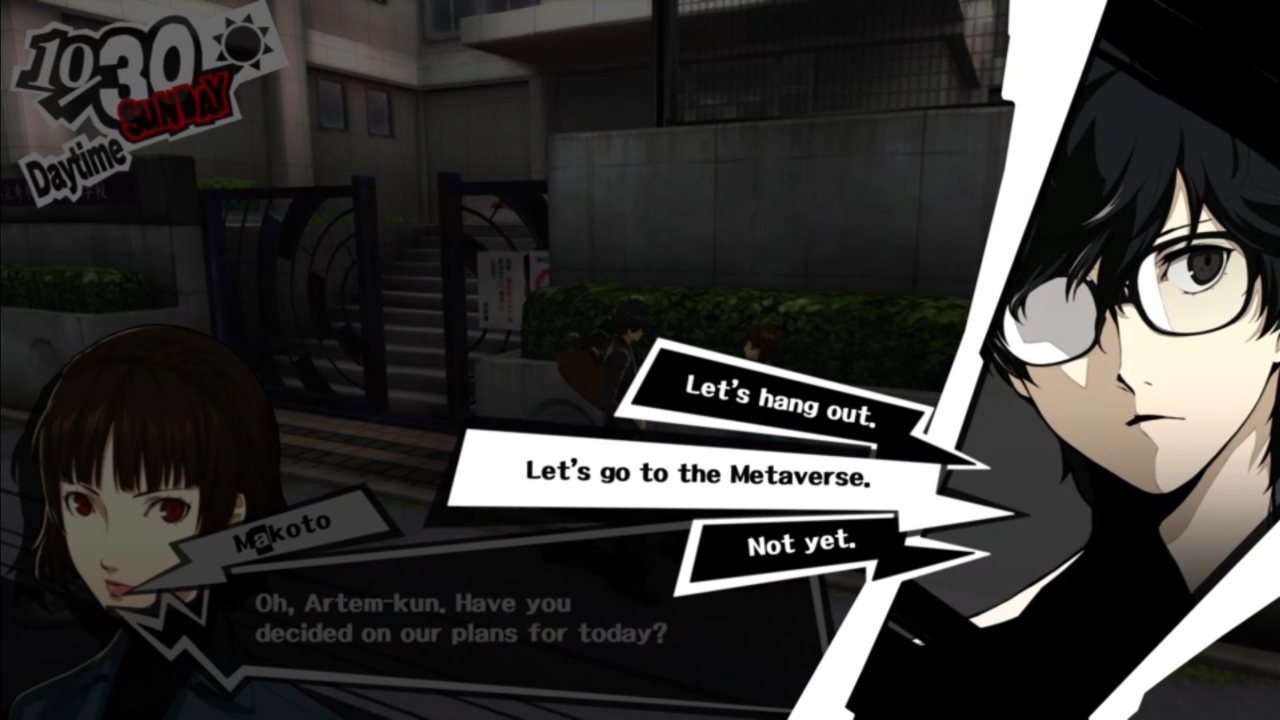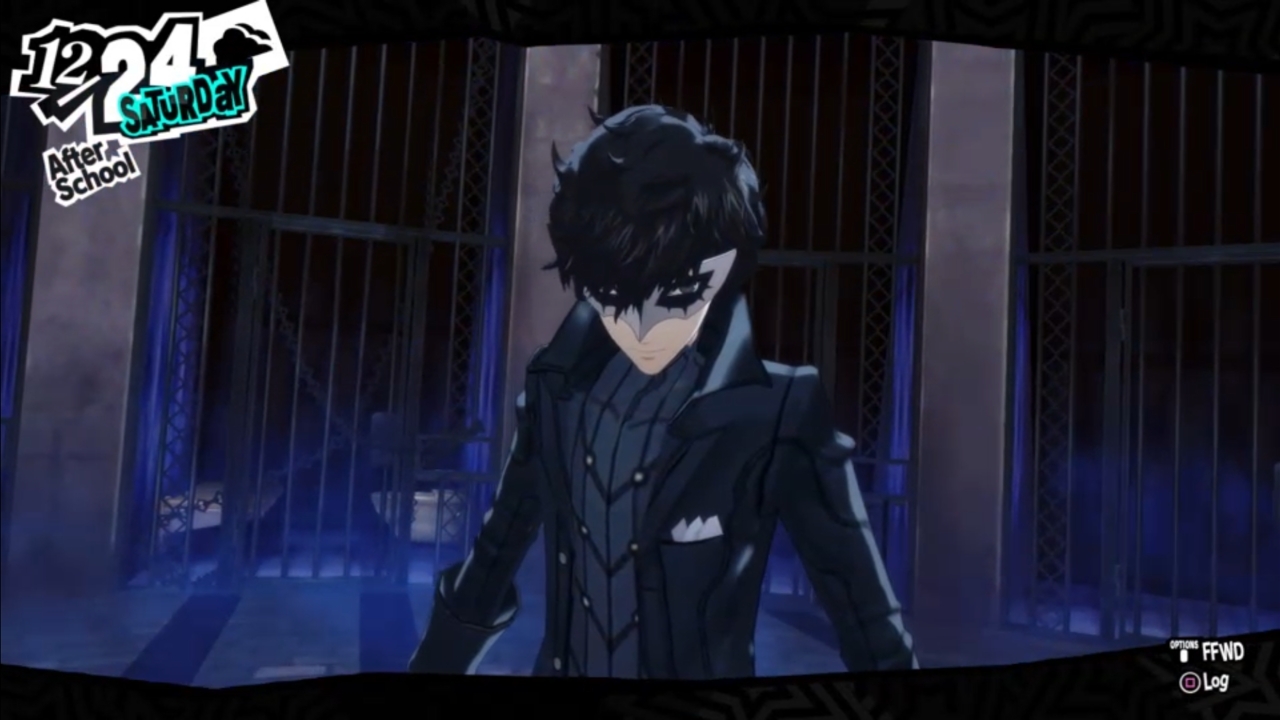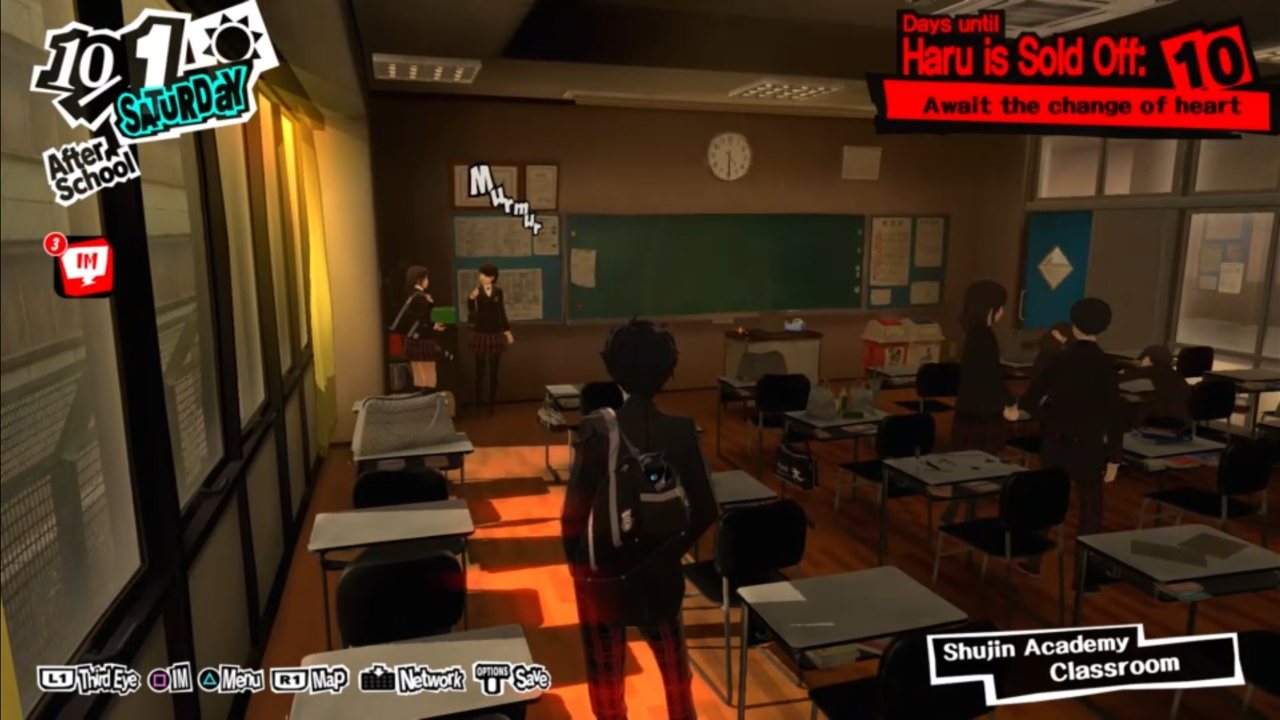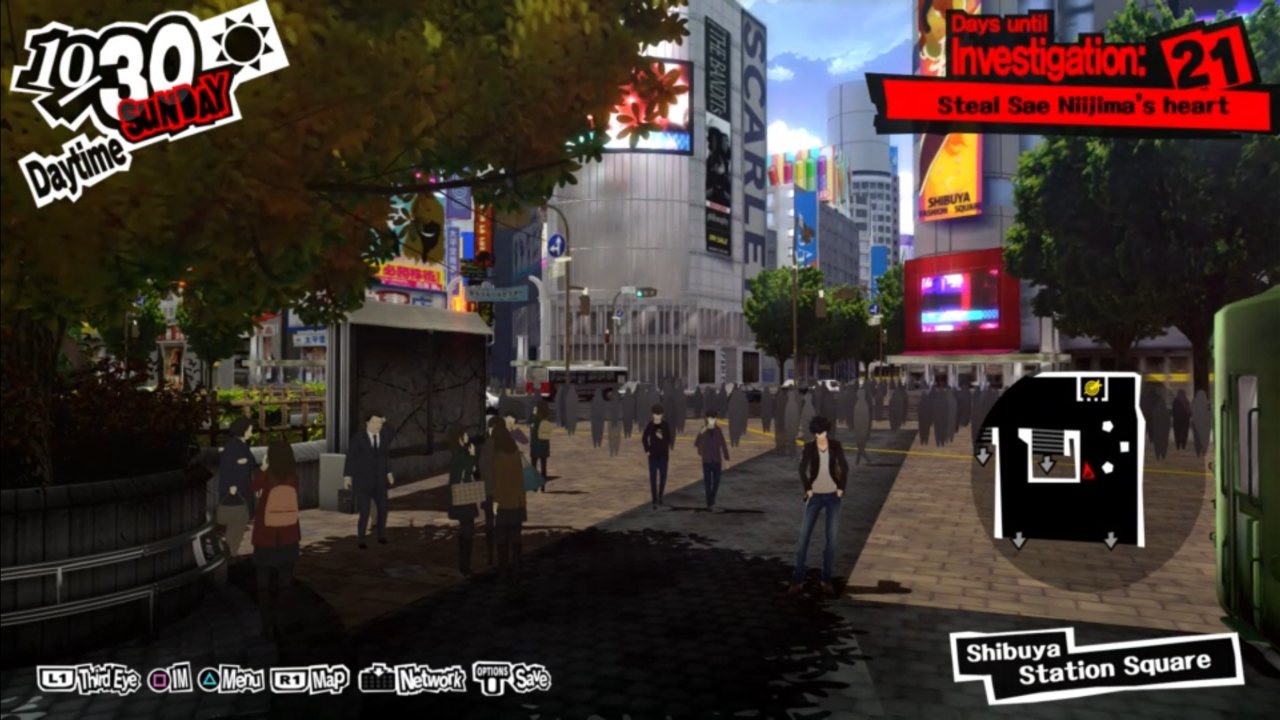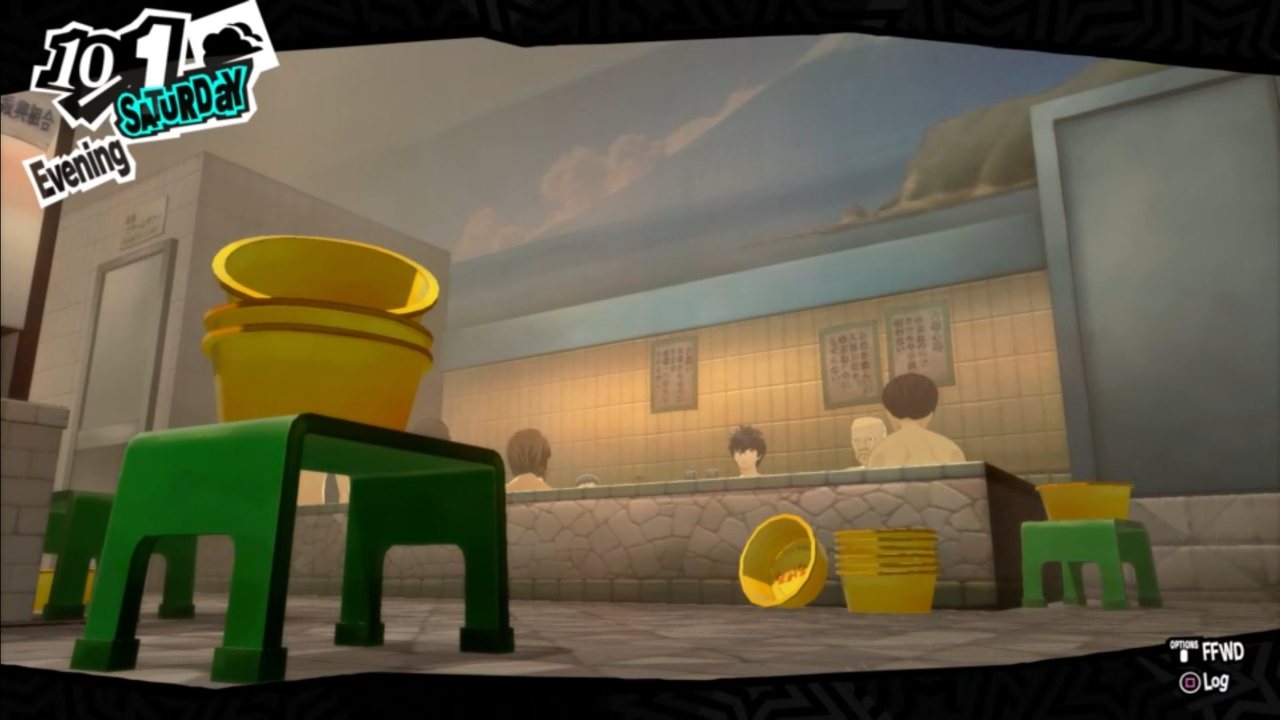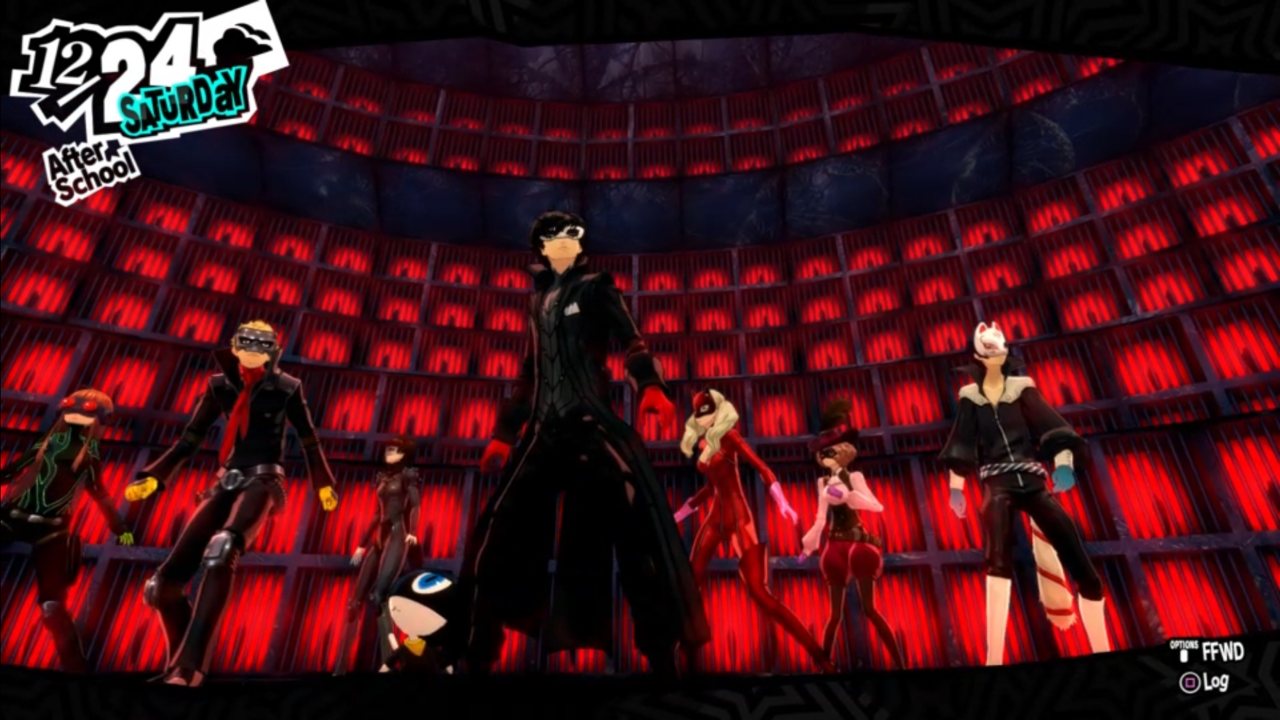The saving joy of Persona 5
I got my copy of Persona 5 in May 2018, but I wouldn’t have a chance to play it until the fall. In June, my wife and I bought a house that, as they say, “needed some work”. As it happens with old homes in Philadelphia, “some work” masked “a crapload of work”, and so we spent the entire summer getting good at taping drywall, rolling paint, negotiating with contractors, and questioning our life choices.
It was already October, when in a scarcely furnished living room with a patch of roughly spackled, unpainted sheetrock, I unearthed my PlayStation from the bottom of a moving box. For the lack of a better option, I placed the console on a shoe rack next to a TV I’d mounted the night before. As I collapsed on a chair (the sofa wouldn’t arrive for another week), I was fully aware of all the unfinished things around me, yet completely incapable of doing anything productive.
The question was what game to pick. In the past, the methodical nature of Dark Souls had helped me power through periods of burnout and self-doubt, but the thought of immersing myself in those gloom worlds at that moment was intolerable. Over a span of several nights, I tried to get into a bunch of new releases but nothing clicked. Until I launched Persona 5.
Thing is, I’m not much of an anime fan. I could only ever get through the most americanized, self-serious titles like Elfen Lied, Death Note, or Ghost in the Shell. Anything with more than a hint of cartoonish humor and exuberant dialogue lines used to put me off. When I bought my copy of Persona 5, I knew there was a good chance I wouldn’t spend a lot of time with it. And, under different circumstances, that might have been true.
The game starts with a bang, throwing the player into a late-game sequence in which the main character, dressed in a carnival mask and a trench-coat, is escaping enemies referred to as Shadows in a glimmering casino building. The chapter features blasting acid jazz, “over the top” costumes, and excited exclamations of your apparent partners, who refer to your character as Joker. Immediately, I hated it, but the responsive controls and a sense of quick progression kept me from quitting right away. Soon, I was mesmerized by the smooth transitions between turn-based fights, stealth elements and story cutscenes. Like a pachinko machine, the game lulled me into the state of flow, in which I was hardly aware of my surroundings. At some point, I caught myself smiling at the screen.
Despite his deft moves and mean arsenal, Joker gets captured by law enforcement and is thrown into a drab windowless room where he’s interrogated by prosecutor Sae Nijima. This interview frames the entire story, which begins when Persona 5’s high-schooler protagonist arrives in Tokyo. Trying to escape the burden of bearing a (wrongful) assault conviction in a small Japanese town, he moves into an attic space above a small coffee and curry shop in Yongen-Jaya, one of the city’s residential districts. His new guardian, the owner of the said shop, a stern middle-aged man named Sojiro Sakura, helps the young man enroll into a public school and, at least in the beginning, keeps a close eye on his whereabouts.
On his first day at school, the protagonist discovers that he can use a mysterious app on his phone to enter the Metaverse: another dimension shaped by people’s thoughts. In this realm, extreme cognitive distortions manifest as Palaces: distorted copies of real spaces controlled by a sovereign mind that created them. The boy and his newfound sidekick Riuji discover that, in Metaverse, the school is a palace of Kamoshida, their physical education teacher. A retired Olympic medalist, he views students as slaves, pushing them beyond their limits in order to maintain the high ranks of school’s volleyball team.
When, unbeknownst, the two boys enter the palace, Shadow Kamoshida captures the intruders and sentences them to death. Being faced with such serious threat triggers the awakening of the protagonist’s Persona (essentially, personas are powerful beings that can be controlled by a master they deem worthy). With the help of Persona, the characters escape their sentence and, on their way out, they run into another major character. Morgana, who’s a cartoonish bipedal cat, promises to teach them about the Metaverse if they help him escape his cell. They do and soon the whole gang is back in reality where the unsuspecting “real” Kamoshida meets our late to school protagonist for the first time.
Having discovered the palace, it doesn’t take friends long to pick up a fight with Kamoshida outside the Metaverse, which results in him scheduling an administrative hearing to get them expelled. Given the probation of the main character and Riuji’s de facto status of school’s trouble-maker, the result of their hearing seems pre-determined. From Morgana, they learn that they can remove the cognitive distortion by stealing Kamoshida’s treasure from his palace, thus triggering a “change of heart” in the real Kamoshida and making him “confess his sins with his own mouth.”
The Kamoshida’s palace establishes the base framework for the entire game: “save the world” (by changing someone’s distorted heart), but don’t forget to remain a diligent student, a good friend, and an upstanding citizen. The time is limited, and the story inevitably moves toward the protagonist’s capture shown in the prologue. Thus, you spend mornings at school, meet friends in the afternoon and juggle part-time jobs at night. All these mundane activities strengthen your bonds with your ever-growing team of “Phantom Thieves” and help you discover better equipment, resources, and tactics to use in the Metaverse.
The main story is engaging and has some unexpected plot twists, but if on the “high-schoolers VS grown-ups” issue you connect more with the latter, be prepared to cringe at times. Gladly, unlike most single-player video games, it’s not the plot, but what you do day-to-day that imbues the game with meaning. What surprised me the most, is how you learn to like the characters who used to annoy you. Not by the virtue of story suddenly making them appear different, but because you learned to embrace their personality quirks. The plot only augments the relationships you build yourself.
For a game that incorporates time management as its core mechanic, Persona 5 is surprisingly relaxing. Going against productivity gurus’ claims, you literally cannot do more than two “significant” things per day (three on weekends), such as having lunch with a friend or going to the public baths. Also, if you spend the afternoon in Metaverse, you take the night off. No exceptions. Therefore, you make slow progress on your projects of choice and give up things that you deem less important. This is a more subtle lesson the game teaches you: take your time, work hard (but be nice to others), and don’t let the public opinion discourage you.
To my surprise, after just a few nights of playing Persona, I felt ready to do things again, but, now more than ever, I was aware of my limits. Whenever I got an urge to finish some extra house work late at night, Morgana’s voice would play in my head: “Aren’t you tired? Let’s go to bed!” Slowly and steadily, I began to regain control over my life, occasionally daring to think into the future. As another unexpected effect, I became more likely to celebrate the wins: big and small; and take time to compliment friends and colleagues on their achievements. And if I fell victim of gamification, it was a welcome change.
That all said, Persona 5 is not a game you play casually. While it can be relaxing and meditative, it deals with serious societal issues that can trigger negative emotions in sensitive people. It’s also a huge time sink. It took me over one hundred hours (and a year of my life) to reach the final ending. In a way, the story is almost discouragingly long and, to make things worse, the pacing is somewhat uneven. I’d usually play it for a few weeks, take a break for a while, the come back when I needed to recharge. This cadence allowed me to finish the game without burning out or feeling too guilty for the time spent.
Despite these minor grumblings, I know Persona 5 will take its place among my all-time favorites. A game, a remake of which I’ll buy for every platform I’ll ever own, just to stay connected to its beautiful, inscrutable world. And through it, to my memories of renovating my first house and planning the next steps in my life and career. Try it, if you have the time. But beware, as it has a way of making you constantly crave ramen, sushi, and pour-over coffee. You’ve been warned.

